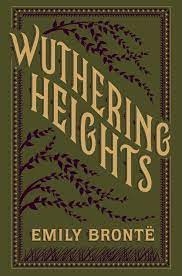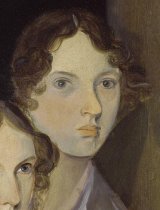Wuthering Heights Page #3
Wuthering Heights is an 1847 novel by Emily Brontë, initially published under the pseudonym Ellis Bell. It concerns two families of the landed gentry living on the West Yorkshire moors, the Earnshaws and the Lintons, and their turbulent relationships with Earnshaw's adopted son, Heathcliff.
She never opened her mouth. I stared—she stared also: at any rate, she kept her eyes on me in a cool, regardless manner, exceedingly embarrassing and disagreeable. “Sit down,” said the young man, gruffly. “He’ll be in soon.” I obeyed; and hemmed, and called the villain Juno, who deigned, at this second interview, to move the extreme tip of her tail, in token of owning my acquaintance. “A beautiful animal!” I commenced again. “Do you intend parting with the little ones, madam?” “They are not mine,” said the amiable hostess, more repellingly than Heathcliff himself could have replied. “Ah, your favourites are among these?” I continued, turning to an obscure cushion full of something like cats. “A strange choice of favourites!” she observed scornfully. Unluckily, it was a heap of dead rabbits. I hemmed once more, and drew closer to the hearth, repeating my comment on the wildness of the evening. “You should not have come out,” she said, rising and reaching from the chimney-piece two of the painted canisters. Her position before was sheltered from the light; now, I had a distinct view of her whole figure and countenance. She was slender, and apparently scarcely past girlhood: an admirable form, and the most exquisite little face that I have ever had the pleasure of beholding; small features, very fair; flaxen ringlets, or rather golden, hanging loose on her delicate neck; and eyes, had they been agreeable in expression, that would have been irresistible: fortunately for my susceptible heart, the only sentiment they evinced hovered between scorn and a kind of desperation, singularly unnatural to be detected there. The canisters were almost out of her reach; I made a motion to aid her; she turned upon me as a miser might turn if any one attempted to assist him in counting his gold. “I don’t want your help,” she snapped; “I can get them for myself.” “I beg your pardon!” I hastened to reply. “Were you asked to tea?” she demanded, tying an apron over her neat black frock, and standing with a spoonful of the leaf poised over the pot. “I shall be glad to have a cup,” I answered. “Were you asked?” she repeated. “No,” I said, half smiling. “You are the proper person to ask me.” She flung the tea back, spoon and all, and resumed her chair in a pet; her forehead corrugated, and her red under-lip pushed out, like a child’s ready to cry. Meanwhile, the young man had slung on to his person a decidedly shabby upper garment, and, erecting himself before the blaze, looked down on me from the corner of his eyes, for all the world as if there were some mortal feud unavenged between us. I began to doubt whether he were a servant or not: his dress and speech were both rude, entirely devoid of the superiority observable in Mr. and Mrs. Heathcliff; his thick brown curls were rough and uncultivated, his whiskers encroached bearishly over his cheeks, and his hands were embrowned like those of a common labourer: still his bearing was free, almost haughty, and he showed none of a domestic’s assiduity in attending on the lady of the house. In the absence of clear proofs of his condition, I deemed it best to abstain from noticing his curious conduct; and, five minutes afterwards, the entrance of Heathcliff relieved me, in some measure, from my uncomfortable state. “You see, sir, I am come, according to promise!” I exclaimed, assuming the cheerful; “and I fear I shall be weather-bound for half an hour, if you can afford me shelter during that space.” “Half an hour?” he said, shaking the white flakes from his clothes; “I wonder you should select the thick of a snow-storm to ramble about in. Do you know that you run a risk of being lost in the marshes? People familiar with these moors often miss their road on such evenings; and I can tell you there is no chance of a change at present.” “Perhaps I can get a guide among your lads, and he might stay at the Grange till morning—could you spare me one?” “No, I could not.” “Oh, indeed! Well, then, I must trust to my own sagacity.” “Umph!” “Are you going to mak’ the tea?” demanded he of the shabby coat, shifting his ferocious gaze from me to the young lady. “Is he to have any?” she asked, appealing to Heathcliff. “Get it ready, will you?” was the answer, uttered so savagely that I started. The tone in which the words were said revealed a genuine bad nature. I no longer felt inclined to call Heathcliff a capital fellow. When the preparations were finished, he invited me with—“Now, sir, bring forward your chair.” And we all, including the rustic youth, drew round the table: an austere silence prevailing while we discussed our meal. I thought, if I had caused the cloud, it was my duty to make an effort to dispel it. They could not every day sit so grim and taciturn; and it was impossible, however ill-tempered they might be, that the universal scowl they wore was their every-day countenance. “It is strange,” I began, in the interval of swallowing one cup of tea and receiving another—“it is strange how custom can mould our tastes and ideas: many could not imagine the existence of happiness in a life of such complete exile from the world as you spend, Mr. Heathcliff; yet, I’ll venture to say, that, surrounded by your family, and with your amiable lady as the presiding genius over your home and heart—” “My amiable lady!” he interrupted, with an almost diabolical sneer on his face. “Where is she—my amiable lady?” “Mrs. Heathcliff, your wife, I mean.” “Well, yes—oh, you would intimate that her spirit has taken the post of ministering angel, and guards the fortunes of Wuthering Heights, even when her body is gone. Is that it?” Perceiving myself in a blunder, I attempted to correct it. I might have seen there was too great a disparity between the ages of the parties to make it likely that they were man and wife. One was about forty: a period of mental vigour at which men seldom cherish the delusion of being married for love by girls: that dream is reserved for the solace of our declining years. The other did not look seventeen. Then it flashed upon me—“The clown at my elbow, who is drinking his tea out of a basin and eating his bread with unwashed hands, may be her husband: Heathcliff junior, of course. Here is the consequence of being buried alive: she has thrown herself away upon that boor from sheer ignorance that better individuals existed! A sad pity—I must beware how I cause her to regret her choice.” The last reflection may seem conceited; it was not. My neighbour struck me as bordering on repulsive; I knew, through experience, that I was tolerably attractive. “Mrs. Heathcliff is my daughter-in-law,” said Heathcliff, corroborating my surmise. He turned, as he spoke, a peculiar look in her direction: a look of hatred; unless he has a most perverse set of facial muscles that will not, like those of other people, interpret the language of his soul.
Translation
Translate and read this book in other languages:
Select another language:
- - Select -
- 简体中文 (Chinese - Simplified)
- 繁體中文 (Chinese - Traditional)
- Español (Spanish)
- Esperanto (Esperanto)
- 日本語 (Japanese)
- Português (Portuguese)
- Deutsch (German)
- العربية (Arabic)
- Français (French)
- Русский (Russian)
- ಕನ್ನಡ (Kannada)
- 한국어 (Korean)
- עברית (Hebrew)
- Gaeilge (Irish)
- Українська (Ukrainian)
- اردو (Urdu)
- Magyar (Hungarian)
- मानक हिन्दी (Hindi)
- Indonesia (Indonesian)
- Italiano (Italian)
- தமிழ் (Tamil)
- Türkçe (Turkish)
- తెలుగు (Telugu)
- ภาษาไทย (Thai)
- Tiếng Việt (Vietnamese)
- Čeština (Czech)
- Polski (Polish)
- Bahasa Indonesia (Indonesian)
- Românește (Romanian)
- Nederlands (Dutch)
- Ελληνικά (Greek)
- Latinum (Latin)
- Svenska (Swedish)
- Dansk (Danish)
- Suomi (Finnish)
- فارسی (Persian)
- ייִדיש (Yiddish)
- հայերեն (Armenian)
- Norsk (Norwegian)
- English (English)
Citation
Use the citation below to add this book to your bibliography:
Style:MLAChicagoAPA
"Wuthering Heights Books." Literature.com. STANDS4 LLC, 2025. Web. 14 Mar. 2025. <https://www.literature.com/book/wuthering_heights_1627>.








Discuss this Wuthering Heights book with the community:
Report Comment
We're doing our best to make sure our content is useful, accurate and safe.
If by any chance you spot an inappropriate comment while navigating through our website please use this form to let us know, and we'll take care of it shortly.
Attachment
You need to be logged in to favorite.
Log In